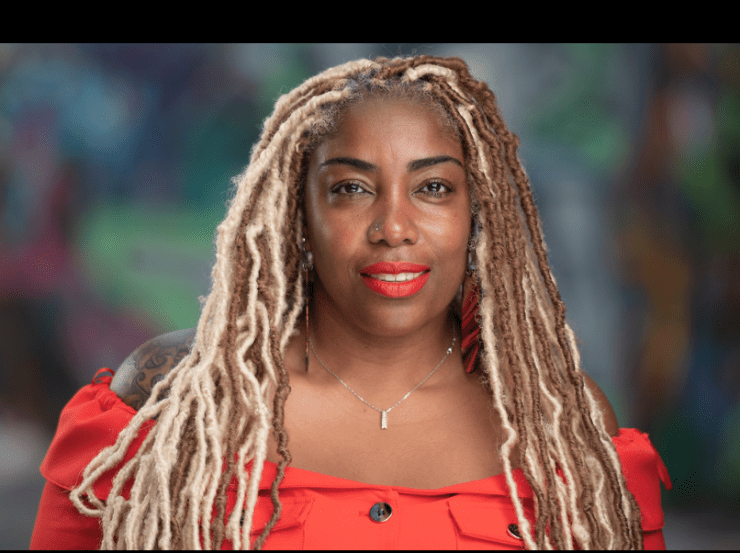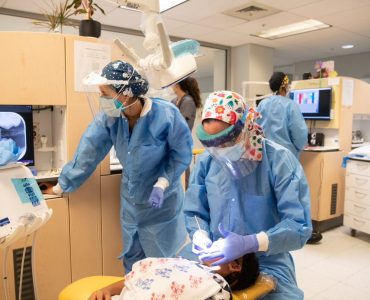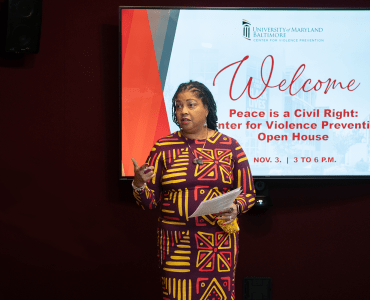The University of Maryland School of Social Work’s Positive Schools Center (PSC) has lived up to its name during the pandemic, having a positive effect on the school communities it serves in Baltimore that were impacted disproportionately by COVID-19.
PSC, which falls under the Social Work Community Outreach Service (SWCOS), works with 12 community schools, staffing each with a coordinator who helps the schools build relationships with students and their families. These relationships became even more important once children were forced to turn to virtual learning when the pandemic unfolded in March 2020.
The center extended its outreach and services to make sure that children had the technology they needed to be able to attend school virtually. The coordinators dropped off devices to students, helped get free internet access when it was needed, and made sure students were able to use the technology to log into virtual learning, said Shantay McKinily, MEd, director of PSC. They also made calls and visited the homes of students who were not in attendance and provided supports to help their families overcome those challenges.
“At one of our schools, our coordinator was able to find every single student,” said McKinily, a former city school principal. “So that took a huge effort to be able to locate every student and be able to figure out: What are the educational barriers? Why weren’t you logging on? What do we need to do to support you?”
Bridget Wrightson, principal at George Washington Elementary, one of the community schools, said Seema Shah-Nelson, LMSW, the George Washington Elementary coordinator, met with her and her staff daily to discuss every student whom they had not seen online that day.
“She reached out individually to families that encountered the greatest barriers to attendance and provided the supports they needed,” Wrightson said. “She raised funds and solicited donations for attendance incentives. She coordinated with partners to provide free internet access and technology to families and worked closely with the district office to ensure that every student had a Chromebook.”
‘A Sense of Security’
Shah-Nelson said she continues to focus on attendance now that students are back in-person this school year.
“We provide daily, weekly, and monthly incentives for consistent attendance, which is not only important for learning, but regular attendance cultivates a sense of security and consistency for children,” she said. “This is especially important during uncertain times. When we see a child struggling, we connect them with the supports they need inside the building, and we reach out to their families to provide resources they might need to support their children at home.”
Wrightson praised the groundwork the center had done at the school before the pandemic for helping the staff during virtual learning.
“Because of the positive school climate that PSC has helped us cultivate over the years, we were able to transfer the tools they’d taught us to the online environment and build community virtually,” Wrightson said. “PSC also provided social-emotional supports for our staff as they navigated the highly stressful world of virtual instruction as well as ongoing professional development.”
PSC’s mission extends to supporting its students’ families and their health and well-being. During the pandemic, PSC and SWCOS partnered with the Maryland Food Bank to distribute more than 35,000 pounds of food.
At George Washington Elementary, PSC delivered more than 100 boxes of groceries to families and received nearly 40 donated boxes of groceries and 40 personal hygiene kits for the school pantry. At Wildwood Elementary/Middle, the community school coordinator helped families navigate acquiring Pandemic-EBT cards distributed by the state, led a food distribution at the school, and made sure families knew of food distribution sites in the area. And at Joseph C. Briscoe Academy, the community school coordinator distributed more than 12,000 pounds of food, hosted a school supply drive, and held a Thanksgiving meal drive; almost 75 percent of its families received at least one resource or service.
“We know that there are racial disparities, and the students and families that we serve are the most impacted,” McKinily said. “The pandemic gave us concrete examples of families that are being impacted by those disparities, because the most marginalized groups were the ones that were suffering the most.”
Grief Support, COVID Vaccines
Grief was also a focus. At several schools, PSC and Family Connections, also part of SWCOS, formed grief support groups.
“I think it was highly effective,” McKinily said. “Families and students of course have gone through a lot. And we trained and supported teachers as they were going through this anxiety and grief of losing students, of losing their own family members.”
When COVID-19 vaccines became available, PSC helped to educate and obtain access, holding two vaccination clinics at schools for parents at Wolfe Street Academy and George Washington Elementary. Its NextGen program, which supports students in meeting their college and career goals and helps them become better citizens through social justice and advocacy, is now working with Open Society Institute on vaccine advocacy by providing educational sessions for teenagers.
The center also focused on the mental well-being of parents, who received self-care kits that included a yoga mat for a yoga session held by PSC, stress balls, and lotions.
“It included things that parents need to give themselves a break and focus on themselves because we know that you can’t pour into somebody when you’re an empty cup,” McKinily said.
‘Our Work Built Trust’
Shah-Nelson said she has seen the effects this work has had on families and students as they returned to in-person learning this year.
“Our work built trust and drew our community closer,” she said. “As we have returned in person, our community is strong.”
McKinily hopes that the work the center and its community school coordinators have done to build relationships will carry into this school year and beyond. That is the center’s focus, and it is reflected in its theme this year: “Moving from the Transactional to the Transformational.”
“With everything that we do, it’s not just giving someone something. It is creating systems that are sustainable,” she said. “Our coordinators are working to create sustainable systems for communities in connecting to school or connecting to different basic needs. It is more than just providing food drives, it is providing links to grocery stores, so that there is a long-lasting relationship for parents to be able to get to those grocery stores.
“We’re trying to create systems where families and schools and communities are able to sustain themselves.”




